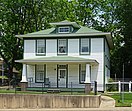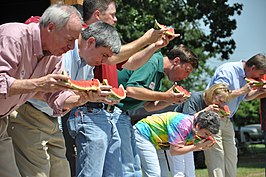Hempstead County, Arkansas
Hempstead County | |
|---|---|
|
Clockwise from top: Hempstead County Courthouse in Hope, Bill Clinton Birthplace, Politicians at the Hope Watermelon Festival, the former Hempstead County Courthouse) | |
 Location within the U.S. state of Arkansas | |
 Arkansas's location within the U.S. | |
| Coordinates: 33°44′07″N 93°40′06″W / 33.7353°N 93.66844°W | |
| Country | |
| State | |
| Founded | December 15, 1818 |
| Named for | Edward Hempstead |
| Seat | Hope |
| Largest city | Hope |
| Area | |
| • Total | 741 sq mi (1,920 km2) |
| • Land | 728 sq mi (1,890 km2) |
| • Water | 14 sq mi (40 km2) 1.8% |
| Population (2020) | |
| • Total | 20,065 |
| • Density | 27/sq mi (10/km2) |
| Time zone | UTC−6 (Central) |
| • Summer (DST) | UTC−5 (CDT) |
| Congressional district | 4th |
| Website | hempsteadcountyar |
Hempstead County is a county located in the U.S. state of Arkansas. As of the 2020 census, the population was 20,065,[1] down from 22,609 at the 2010 census.[2] The county seat is Hope.[3] Hempstead County is Arkansas's fourth county, formed on December 15, 1818, alongside Clark and Pulaski counties. The county is named for Edward Hempstead, a delegate to the U.S. Congress from the Missouri Territory, which included present-day Arkansas at the time.[4] It is an alcohol prohibition or dry county.
The 42nd United States President, Bill Clinton, who served from 1993 to 2001, was born in the county seat of Hope on August 19, 1946.[5] As of 2024, Clinton is the first and only President to have been born in Arkansas.
Geography
[edit]According to the U.S. Census Bureau, the county has a total area of 741 square miles (1,920 km2), of which 728 square miles (1,890 km2) is land and 14 square miles (36 km2) (1.8%) is water.[6] Hempstead County is alternately considered as part of the greater regions of South Arkansas or Southwest Arkansas.
Major highways
[edit]Adjacent counties
[edit]- Pike County (north)
- Nevada County (east)
- Lafayette County (south)
- Miller County (southwest)
- Little River County (west)
- Howard County (northwest)
Demographics
[edit]| Census | Pop. | Note | %± |
|---|---|---|---|
| 1830 | 2,512 | — | |
| 1840 | 4,921 | 95.9% | |
| 1850 | 7,672 | 55.9% | |
| 1860 | 13,989 | 82.3% | |
| 1870 | 13,768 | −1.6% | |
| 1880 | 19,015 | 38.1% | |
| 1890 | 22,796 | 19.9% | |
| 1900 | 24,101 | 5.7% | |
| 1910 | 28,285 | 17.4% | |
| 1920 | 31,602 | 11.7% | |
| 1930 | 30,847 | −2.4% | |
| 1940 | 32,770 | 6.2% | |
| 1950 | 25,080 | −23.5% | |
| 1960 | 19,661 | −21.6% | |
| 1970 | 19,308 | −1.8% | |
| 1980 | 23,635 | 22.4% | |
| 1990 | 21,621 | −8.5% | |
| 2000 | 23,587 | 9.1% | |
| 2010 | 22,609 | −4.1% | |
| 2020 | 20,065 | −11.3% | |
| 2023 (est.) | 19,343 | [7] | −3.6% |
| U.S. Decennial Census[8] 1790–1960[9] 1900–1990[10] 1990–2000[11] 2010–2020[2][1] | |||

2020 census
[edit]| Race | Num. | Perc. |
|---|---|---|
| White (non-Hispanic) | 10,558 | 52.62% |
| Black or African American (non-Hispanic) | 5,644 | 28.13% |
| Native American | 81 | 0.4% |
| Asian | 88 | 0.44% |
| Pacific Islander | 5 | 0.02% |
| Other/Mixed | 736 | 3.67% |
| Hispanic or Latino | 2,953 | 14.72% |
As of the 2020 United States census, there were 20,065 people, 8,094 households, and 5,711 families residing in the county.
2000 census
[edit]As of the 2000 census,[14] there were 23,587 people, 8,959 households, and 6,378 families residing in the county. The population density was 32 inhabitants per square mile (12/km2). There were 10,178 housing units at an average density of 14 per square mile (5.4/km2). The racial makeup of the county was 63.28% White, 30.36% Black or African American, 0.42% Native American, 0.17% Asian, 0.02% Pacific Islander, 4.17% from other races, and 1.59% from two or more races. 8.25% of the population were Hispanic or Latino of any race.
There were 8,959 households, out of which 33.40% had children under the age of 18 living with them, 51.40% were married couples living together, 15.30% had a female householder with no husband present, and 28.80% were non-families. 25.50% of all households were made up of individuals, and 11.70% had someone living alone who was 65 years of age or older. The average household size was 2.60 and the average family size was 3.09.
In the county, the population was spread out, with 27.30% under the age of 18, 9.60% from 18 to 24, 27.20% from 25 to 44, 21.70% from 45 to 64, and 14.10% who were 65 years of age or older. The median age was 35 years. For every 100 females, there were 93.70 males. For every 100 females age 18 and over, there were 89.70 males.
The median income for a household in the county was $28,622, and the median income for a family was $34,082. Males had a median income of $25,830 versus $17,383 for females. The per capita income for the county was $14,103. About 16.00% of families and 20.30% of the population were below the poverty line, including 29.20% of those under age 18 and 16.70% of those age 65 or over.
Government
[edit]Starting in 2008, voters of Hempstead County have shifted to the political right in US presidential elections. That said, the city of Hope is still very Democratic as of the 2020 election.[15]
| Year | Republican | Democratic | Third party(ies) | |||
|---|---|---|---|---|---|---|
| No. | % | No. | % | No. | % | |
| 2020 | 4,470 | 65.27% | 2,138 | 31.22% | 240 | 3.50% |
| 2016 | 4,401 | 62.43% | 2,377 | 33.72% | 271 | 3.84% |
| 2012 | 4,284 | 61.90% | 2,468 | 35.66% | 169 | 2.44% |
| 2008 | 4,273 | 58.14% | 2,869 | 39.04% | 207 | 2.82% |
| 2004 | 3,580 | 48.04% | 3,817 | 51.22% | 55 | 0.74% |
| 2000 | 3,257 | 44.68% | 3,937 | 54.01% | 95 | 1.30% |
| 1996 | 2,021 | 26.76% | 4,983 | 65.99% | 547 | 7.24% |
| 1992 | 2,387 | 26.75% | 5,476 | 61.38% | 1,059 | 11.87% |
| 1988 | 3,938 | 50.49% | 3,841 | 49.25% | 20 | 0.26% |
| 1984 | 4,904 | 59.31% | 3,327 | 40.24% | 37 | 0.45% |
| 1980 | 3,852 | 44.65% | 4,671 | 54.14% | 105 | 1.22% |
| 1976 | 2,859 | 34.63% | 5,397 | 65.37% | 0 | 0.00% |
| 1972 | 4,963 | 70.80% | 2,047 | 29.20% | 0 | 0.00% |
| 1968 | 1,783 | 24.62% | 2,322 | 32.07% | 3,136 | 43.31% |
| 1964 | 2,493 | 42.32% | 3,355 | 56.95% | 43 | 0.73% |
| 1960 | 1,948 | 40.93% | 2,596 | 54.55% | 215 | 4.52% |
| 1956 | 2,227 | 44.57% | 2,694 | 53.91% | 76 | 1.52% |
| 1952 | 2,115 | 43.28% | 2,771 | 56.70% | 1 | 0.02% |
| 1948 | 386 | 12.58% | 1,683 | 54.84% | 1,000 | 32.58% |
| 1944 | 624 | 22.37% | 2,157 | 77.34% | 8 | 0.29% |
| 1940 | 415 | 12.85% | 2,814 | 87.15% | 0 | 0.00% |
| 1936 | 190 | 7.24% | 2,431 | 92.68% | 2 | 0.08% |
| 1932 | 317 | 10.03% | 2,840 | 89.90% | 2 | 0.06% |
| 1928 | 886 | 30.25% | 2,038 | 69.58% | 5 | 0.17% |
| 1924 | 715 | 30.37% | 1,459 | 61.98% | 180 | 7.65% |
| 1920 | 1,754 | 43.65% | 2,239 | 55.72% | 25 | 0.62% |
| 1916 | 1,238 | 37.05% | 2,103 | 62.95% | 0 | 0.00% |
| 1912 | 836 | 31.63% | 1,247 | 47.18% | 560 | 21.19% |
| 1908 | 1,346 | 41.68% | 1,779 | 55.09% | 104 | 3.22% |
| 1904 | 1,477 | 49.41% | 1,410 | 47.17% | 102 | 3.41% |
| 1900 | 1,330 | 49.11% | 1,352 | 49.93% | 26 | 0.96% |
| 1896 | 1,203 | 39.26% | 1,832 | 59.79% | 29 | 0.95% |
Communities
[edit]

Cities
[edit]- Blevins
- Hope (county seat)
- Washington
Towns
[edit]Unincorporated communities
[edit]Townships
[edit]Townships in Arkansas are the divisions of a county. Each township includes unincorporated areas; some may have incorporated cities or towns within part of their boundaries. Arkansas townships have limited purposes in modern times. However, the United States census does list Arkansas population based on townships (sometimes referred to as "county subdivisions" or "minor civil divisions"). Townships are also of value for historical purposes in terms of genealogical research. Each town or city is within one or more townships in an Arkansas county based on census maps and publications. The townships of Hempstead County are listed below; listed in parentheses are the cities, towns, and/or census-designated places that are fully or partially inside the township. [17][18]
See also
[edit]- List of lakes of Hempstead County, Arkansas
- National Register of Historic Places listings in Hempstead County, Arkansas
References
[edit]- ^ a b "QuickFacts". U.S. Census Bureau. April 1, 2020. Retrieved March 21, 2022.
- ^ a b "State & County QuickFacts". United States Census Bureau. Archived from the original on June 7, 2011. Retrieved May 21, 2014.
- ^ "Find a County". National Association of Counties. Archived from the original on May 31, 2011. Retrieved June 7, 2011.
- ^ Gannett, Henry (1905). The Origin of Certain Place Names in the United States. Govt. Print. Off. pp. 154.
- ^ "William J. Clinton". The White House. Retrieved July 22, 2022.
- ^ "2010 Census Gazetteer Files". United States Census Bureau. August 22, 2012. Retrieved August 26, 2015.
- ^ "Annual Estimates of the Resident Population for Counties: April 1, 2020 to July 1, 2023". United States Census Bureau. Retrieved March 30, 2024.
- ^ "U.S. Decennial Census". United States Census Bureau. Retrieved August 26, 2015.
- ^ "Historical Census Browser". University of Virginia Library. Retrieved August 26, 2015.
- ^ Forstall, Richard L., ed. (March 27, 1995). "Population of Counties by Decennial Census: 1900 to 1990". United States Census Bureau. Retrieved August 26, 2015.
- ^ "Census 2000 PHC-T-4. Ranking Tables for Counties: 1990 and 2000" (PDF). United States Census Bureau. April 2, 2001. Archived (PDF) from the original on March 27, 2010. Retrieved August 26, 2015.
- ^ Based on 2000 census data
- ^ "Explore Census Data". data.census.gov. Retrieved December 10, 2021.
- ^ "U.S. Census website". United States Census Bureau. Retrieved May 14, 2011.
- ^ Park, Alice; Smart, Charlie; Taylor, Rumsey; Watkins, Miles (February 2, 2021). "An Extremely Detailed Map of the 2020 Election". The New York Times. ISSN 0362-4331. Retrieved April 15, 2021.
- ^ "Dave Leip's Atlas of U.S. Presidential Elections". Retrieved November 18, 2016.
- ^ 2011 Boundary and Annexation Survey (BAS): Hempstead County, AR (PDF) (Map). U. S. Census Bureau. Archived from the original (PDF) on October 19, 2012. Retrieved August 24, 2011.
- ^ "Arkansas: 2010 Census Block Maps - County Subdivision". United States Census Bureau. Retrieved May 28, 2014.





